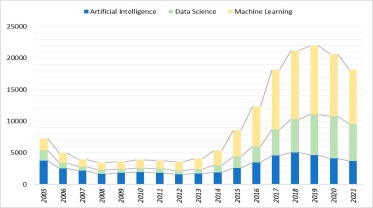
Artificial Intelligence and the Checkout Line: How AI-Induced Unemployment Influences Our Spending Habits
As artificial intelligence transforms the contemporary job market, it is also subtly altering a realm that may come as a surprise: consumer behavior. A recent article in the Journal of Business Research highlights a significant psychological schism in how individuals react following job loss—a schism that depends on whether they were succeeded by humans or machines.
The study, which involved five experiments and included over 850 participants from diverse sectors, discovered that employees displaced by AI are more inclined to engage in conspicuous consumption—buying eye-catching, status-indicating goods—while those who lost their jobs to human competitors often channel their dismay into charitable donations and community-oriented spending.
This finding introduces an impactful psychological dimension to current discussions regarding the consequences of automation on employment. It appears that the anxiety and identity upheavals caused by job automation not only influence employees’ careers but also their financial behaviors and values.
Two Types of Challenges, Two Types of Reactions
The research differentiates between two fundamental forms of job loss:
– AI-Driven Displacement: When individuals find themselves out of work due to AI systems, they encounter a heightened sense of loss of agency. AI transcends human constraints—it evolves, learns, and excels—leading many to feel overwhelmed and even obsolete.
– Human Replacement: When staff lose their positions due to rivalry with other workers or lower-cost labor, it jeopardizes their social reputation and sense of belonging. These individuals frequently interpret the loss as a personal inadequacy, causing feelings of shame, isolation, or social comparison.
Both situations are distressing—but the catalysts and their emotional repercussions vary. The subsequent effect? Divergent consumer behaviors that can appear contradictory at first glance.
Noteworthy Discoveries: Shopping as a Psychological Resilience Tool
Insights from the experiments revealed unique behaviors post-displacement, influenced by the source of replacement. Here are some key findings:
– 41.8% of those replaced by AI favored items with prominent branding, whereas merely 23.9% of individuals replaced by humans did the same.
– On average, participants replaced by AI contributed less in charitable contexts ($7.19) compared to those replaced by humans ($10.30).
– In instances of job loss due to AI, spending behavior was influenced by diminished feelings of self-control.
– Conversely, when human competition was the cause, spending on altruistic causes was influenced by feelings of threatened belonging.
From stylish Nike caps to donations for local educational programs, the variations in consumer spending were not arbitrary—they were deeply connected to the specific psychological threat associated with their job displacement.
Real Decisions Reflect Genuine Emotions
The study extended beyond theoretical situations. Participants experienced simulated job losses in controlled settings before making actual financial decisions—such as choosing which branded product to receive or deciding on the amount of a bonus to contribute to charity.
Even among occupations facing different levels of automation risk, from warehouse staff to junior developers, the observed patterns remained consistent. The researchers concluded that these choices act as coping mechanisms: ostentatious purchases to regain control and status, or charitable giving to restore a sense of community and social value.
Self-Affirmation as a Potential Remedy
However, there may be a strategy to mitigate these involuntary changes in spending. The researchers introduced an exercise in self-affirmation, prompting participants to reflect on their personal values—such as family, integrity, or assisting others.
Following this brief psychological exercise, the disparities in consumption largely diminished. This outcome indicates that reinforcing one’s broader identity can aid individuals in navigating the emotional turbulence of job loss, regardless of whether their redundancy stemmed from technology or human rivalry.
Implications for Business, Policy, and Society
As AI integration accelerates across various fields—from customer service automation to logistics—these findings hold significant implications for governments, employers, and even marketers.
For Employers and Workforce Strategists:
– Acknowledge the emotional toll of AI-related layoffs. Implement support programs focusing not only on retraining but also on reinstating a sense of control.
– Self-affirmation strategies or counseling may substantially ease transitions and enhance workforce morale.
For Marketers:
– Employees displaced by AI might lean toward brands that represent control and prestige. These insights may inform product positioning and promotional strategies in industries undergoing swift automation.
For Policymakers:
– Varied support systems may be necessary depending on the type of job loss. Programs promoting social integration could benefit those replaced by human employees, while workers impacted by AI might require initiatives that restore their sense of agency and engagement in technological advancements.
Broader Questions, Shifting Realities
Ultimately, the study raises a more profound philosophical question: how do we prepare society not merely in economic terms, but emotionally, for existing and thriving alongside machines that outperform us?
With projections indicating that AI could eventually displace up to 300 million full-time jobs (as per the Goldman Sachs Institute), the psychosocial ramifications warrant as much attention as workforce retraining initiatives.
In this transition, consumer behaviors—often regarded as trivial—reflect deeper societal dynamics.